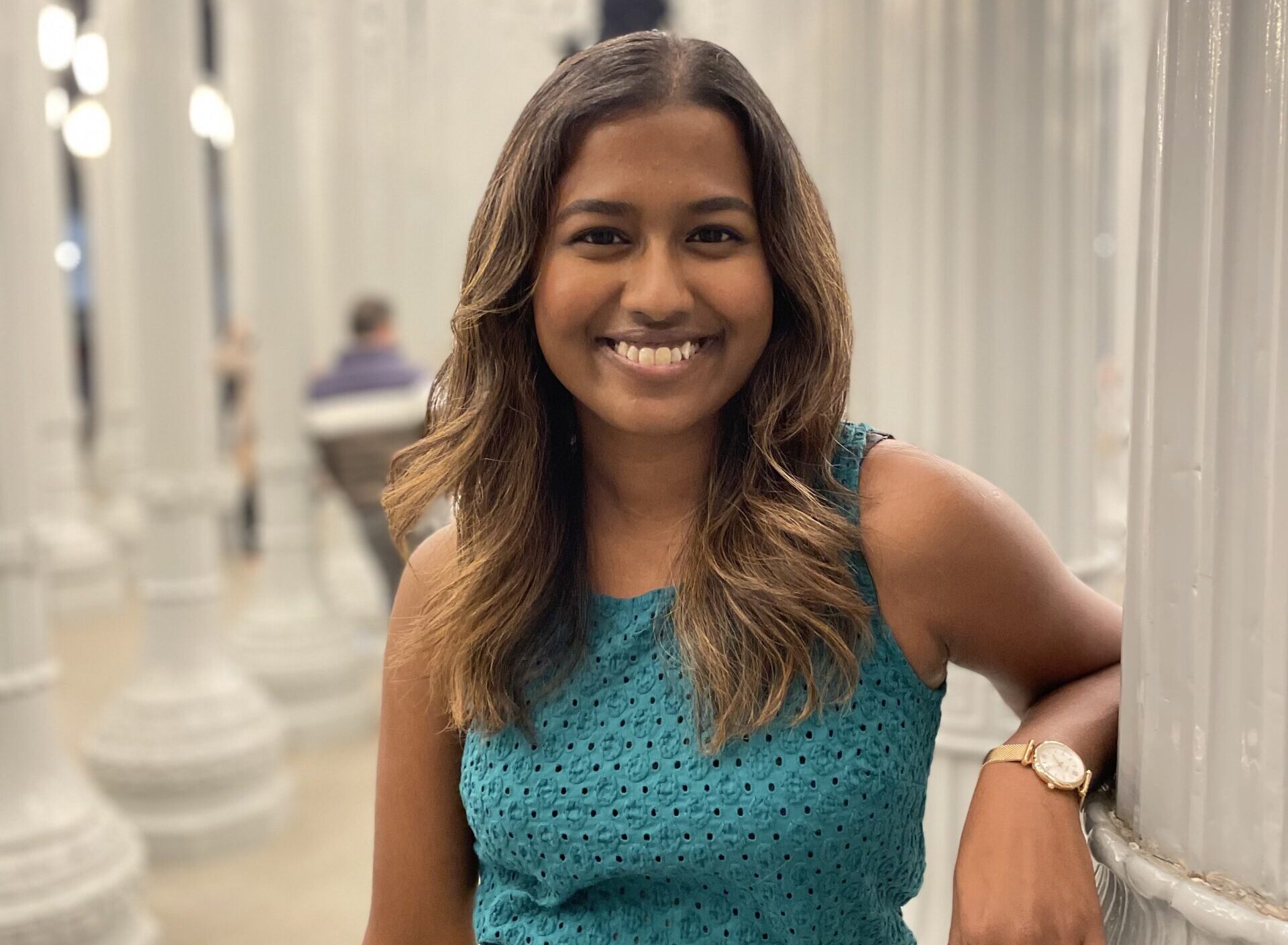The Science of Speech: Ph.D. Student Helen Dominic Researches Improvements in Ways We Handle Immigrant Care
For patients who are not fluent in English, language barriers can cause miscommunication between the patient and their medical team, even when a third party interpreter is present. At best, the patient may feel as though they do not have autonomy, at worst, they may not receive the best medical care.
Graduate linguistics student Helen Dominic is examining the power that listening can have on healing that will improve health care for immigrants by utilizing narrative medical practices. Dominic, a fourth-year Ph.D. student, is performing intersectional research through the Medical Humanities Initiative that will improve health care for immigrants by utilizing narrative medical practices.
Listening, Learning, Linguistics

Dominic stands in front of Healy Hall with her family
Originally from Singapore, Dominic’s interest in linguistics began at a young age.
“A lot of my research has been shaped by my own experiences of being an immigrant,” Dominic says. “I was born in India, but my family moved to Singapore when I was two, which made me very aware of how language shapes society and how it has shaped me.”
Dominic says that being a racial minority in Singapore played a major role in her ultimate pursuit of earning a Ph.D. in linguistics and moving to a culturally diverse city like Washington, DC.
Since she started her program, Dominic’s primary research focus has been within immigrant discourse. When she came to Georgetown, Dominic was able to find a community in the Department of Linguistics, specifically, in a branch that examines the intersection of health care and language.
“The more I learned, the more I realized that there is so much work that needs to be done within immigrant discourse and medical care,” Dominic explains. “Currently, I’m on the pathway to writing my dissertation that will focus on interpretation in medical settings, specifically the immigrant interpreter’s experiences.”
When an immigrant with limited proficiency in English needs medical care, they tend to bring a family member or friend along with them who can communicate with medical staff and offer moral support. In these interactions, there are many possibilities for miscommunication.
“At any point when three people are involved in a conversation, there are many chances for miscommunication — this is the case even when all parties speak English and the miscommunication is compounded further when there is a person who can’t speak a specific language that the other two know,” Dominic explains. “The problem with the specific triad that I’m looking at is that the patient is often the one who’s left out. As much as it is their body, their pain and their desire to be better that needs to be considered, it’s oftentimes really tough for them to communicate in the way that will make them feel comfortable.”
This problem is further complicated by potential biases held by the family member or friend who is interpreting. Since they know the individual they are representing so well, they can overlook or over-emphasize certain aspects of the individual’s problem to medical professionals. However, to the patient, their family member or friend is still valued and necessary in the interaction. This creates a complex problem with attempting to understand how to best provide care for immigrant patients with limited proficiency in English.

Dominic with Dr. John Rickford, a linguistics professor at Stanford, during the annual Georgetown University Round Table (GURT) in 2019
Dominic’s research thus focuses on the family member involved in the interaction and how that intersects with their immigrant identity.
“I think any immigrant would say that translating for their parents is such an important part of their life growing up,” Dominic says. “Being a part of Georgetown has been a good space for me to explore this topic.”
A graduate fellow with the new Medical Humanities Initiative, which examines the intersection of medicine and the humanities, Dominic hopes that this research will continue to allow her to work with doctors to improve doctor education.
“Intercultural communication can definitely be more strongly taught in medical education, including doctors, nurses, techs and so on,” Dominic explains. “ I would like to ultimately translate my research into materials for medical staff education, which I know will be well received here in Georgetown. The university’s medical school already has programs in place to ensure that they are not only educating their doctors, but trying to reduce burnout among students.
“They also emphasize that doctors should not only read within their fields of science and medicine, but keep up-to-date on best quality care practices that will guarantee they are caring for the whole person,” Dominic continues.
One of the ways to provide this holistic care is referred to as narrative medicine, where doctors and medical professionals listen to the individual stories of the patients to comprehensively provide aid. This concept is even more crucial for immigrant families who are not only dealing with varying life issues but differing cultural expectations of health care.
During her year-long fellowship, Dominic will have the chance to observe these triadic interactions, and talk to patients, doctors, and family members one-on-one.
“What the doctors perceive of the interaction might be so different than what the patients experience and perceive, so I will be spending a lot of time listening to people’s stories and narratives and seeing how to come to a middle ground when creating and promoting these educational materials.”
Lakshmi Krishnan, MD, Ph.D. and director of the Medical Humanities Initiative, says that “Helen’s project aligns beautifully with the mission and vision of MHI.”
“Leveraging linguistics methodologies with a keen awareness of structural and cultural competencies and motivated by her personal experiences, Helen’s work turns a much-needed critical lens upon health professional education and will impact practitioner-patient communication as well as improve immigrant health care,” Krishnan continues. “We are thrilled to support it through a Graduate Research Fellowship.”
Life After a Linguistics Program

Doing fieldwork at Ocracoke Island, North Carolina led by Dominic’s advisor, Dr. Natalie Schilling
After earning her Ph.D., Dominic plans to enter the healthcare research field. More specifically, she hopes to study intercultural communication and linguistics in the telehealth world.
Dominic says that her mentors at Georgetown have been instrumental to her success. Her main advisor, Natalie Schilling, Ph.D., and professor in the linguistics department, helped Dominic think more deeply about how language can reflect and construct the institution, and how this affects policy and culture.
Schilling, who works closely with Dominic, says that she “is a dedicated, thoughtful and uniquely collegial student and researcher.”
“Her original research promises to make invaluable contributions to the study of communicative practices in healthcare encounters and their impact on health outcomes and the overall well-being of patients and other concerned parties,” Schilling continues. “In addition, she is contributing to our sociolinguistic understandings of how people shape identities and role relations through language in both everyday and institutional interactions.”
Heidi Hamilton, professor emerita, is a pioneer in studying the intersection of language and medicine, which greatly shaped the work done by Dominic. Finally, Alexandra Johnston, assistant teaching professor and director of the Language & Communication Masters Program, helped to guide Dominic’s thoughts on how to make her research applicable and useful to the communities she is studying.
“I am very lucky to have three incredible women as mentors and on my committee,” says Dominic. “What I have ultimately learned from them is that it is so important to have conversations across disciplines and to share ideas. We can all be viewing the same painting at the same time, but what a scientist notices is going to be extremely different from what someone who studies literature notices. I think the better that we get at noticing things that are outside of our fields, the more effective solutions we will find that are going to solve a lot of these extremely complex and dynamic problems.”


